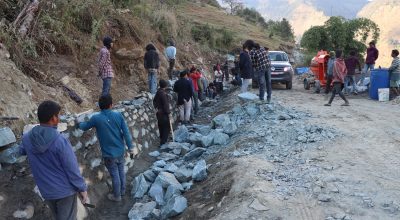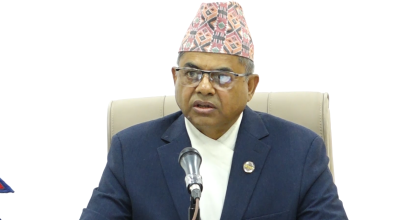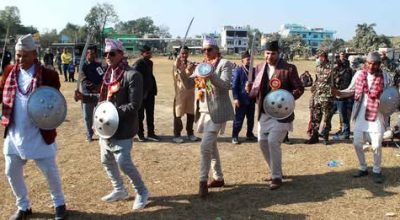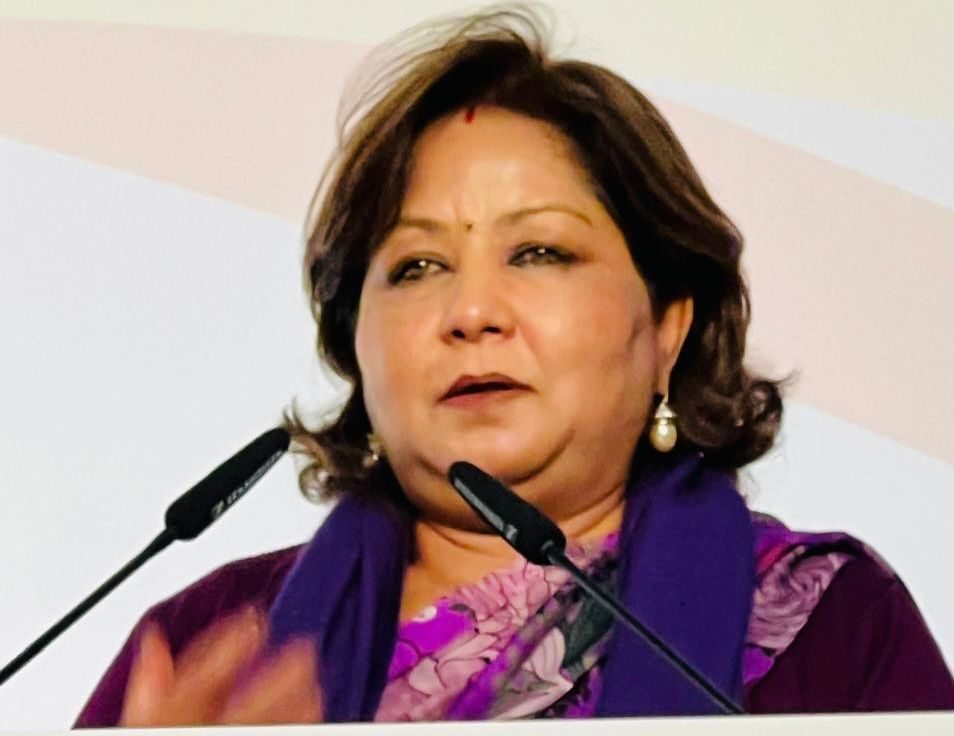
Dr Arzu Rana Deuba
I feel truly honored to be invited to speak to this distinguished audience at the Indo-Nepal Economic Conference. I thank the organizers – Kathmandu University & Nepal Centre for Contemporary Studies and EGROW Foundation for inviting me to share my thoughts on the subject.
The “Regional Synergy for Sustainable Development” Conference’s focus on Nepal-India relations is pertinent. The deep engagements between our nations are multifaceted, productive and serve as a vital part of regional cooperation initiatives in South Asia as a whole.
Let me start by reiterating Rt. Hon. Prime Minister of India, Shree Narendra Modi ji’s statement about India-Nepal relation at Nepal’s Constitutional Assembly on 3rd August 2014. I quote “Humaare sambandha kaagaz ki kashtiyon se aage nahi badhe hai. Humaare sambandha dilon ke daastan kahate hai”.
Indeed, our relations are built on the bonding of hearts and shared socio -cultural value and heritage. I believe India and Nepal are among the nearest and dearest of neighbours in the world today. Our shared geography forms all that is south of the Himalayas, and our bond is underlined by broad cultural unity and economic complementarities. Rivers that flow wholly from Nepal’s mountains are a source of life to all our friends and families living on the Indian plains, whilst the clouds that form above the Bay of Bengal are the source of snow and rain in Nepal. India is our largest trading partner, significant contributor in Foreign Direct Investment and a transit country for our international trade and connectivity.
We feel that the people of India have always been on the side of the Nepalese people in our ‘tryst with democracy’. India’s dedicated support in education, health, infrastructure development, institution building and industrialization of Nepal further consolidates and deepens this bond.
Multifaceted family ties, religious pilgrimages and cultural festivals have kept us close for generations. While in recent years, substantive progress has been made in expanding and deepening bilateral economic cooperation through formal channels. There has been good progress in organizing regular meetings of bilateral mechanisms to implement important past agreements, and to chart out a longer term vision that seeks the mutual benefit of both our nations.
It is important to note, that major cross-border infrastructure projects such as Integrated Check Posts (ICPs), rail linkages, petroleum products pipelines, power transmission lines, roads, and motorable bridges have been built via this formalized economic cooperation. Most recently, never-before-seen progress was made in cross-border electricity trade between the two countries. The starting point of this initiative was the ground-breaking agreement that was reached between Prime Minister Shree Modi ji of India, and Former Prime Minister Shree Deuba ji of Nepal during the latter’s state visit to India in April of 2022 as Prime Minister. Envisioning the export of power equivalent to 10,000 MW from Nepal to India within a time frame of 10 years was the key point of this agreement. Amongst the ground breaking agreements reached at that juncture in the power sector were:
(a) Joint development of Power Generation projects in Nepal,
(b) Development of cross-border transmission infrastructure,
(c) Bi-directional power trade with appropriate access to electricity markets in both countries based on mutual benefits, market demand and applicable domestic regulations of each country,
(d) Coordinated operation of the national grids and
(e) Institutional cooperation in sharing latest operational information, technology and know-how.
This agreement serves as a strong reason for hydropower developers to view Nepal’s energy market as one worth investing in today. Moreover, the very recent signing of a historic tripartite power sales agreement has enabled Nepal to sell 40 MW of power to Bangladesh via the Indian grid. We highly appreciate the leadership in India creating the environment for this breakthrough.
With a view to further advancing economic cooperation, the promotion of trade between the two countries is a top priority. However, it is a matter of concern that the trade between Nepal and India is asymmetric. For every rupee of goods and services exported to India, Nepal imports ten rupees’ worth. Consequently, the widening trade deficit with India alone has now reached almost one-sixth of Nepal’s Gross Domestic Output. Concern over the sustainability of Nepal’s trade deficient needs to be seriously addressed. Thus, I hope the deliberations at this forum will discuss innovative ways for collaboration to support the expansion and diversification of Nepal’s trade to India to ensure sustainability and more equal footing. Collaboration in sectors of information technology, the gig-economy with software development, should serve as a boon for the talented youth of Nepal, as well as a market for the Indian IT sector.
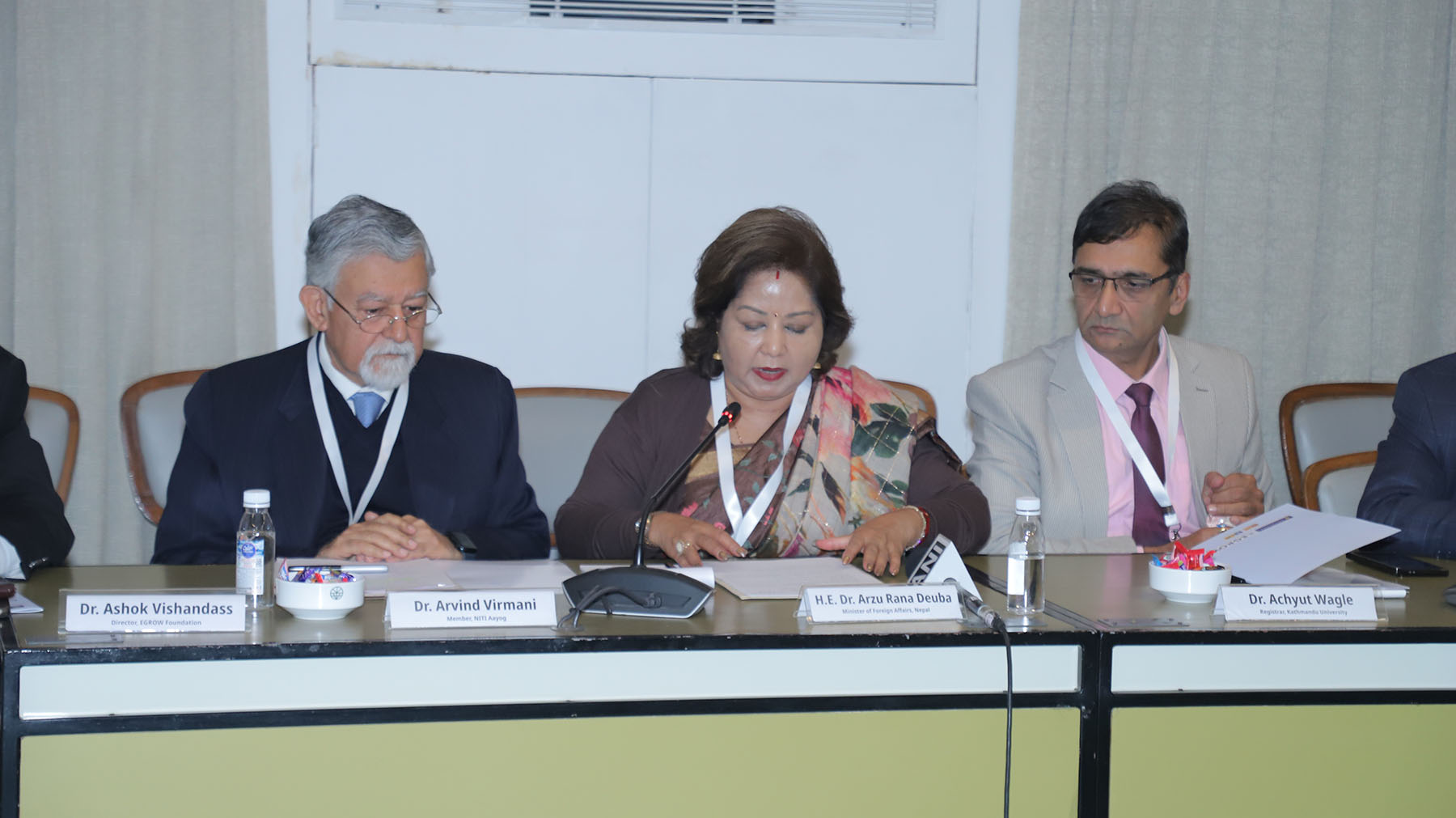
Many infrastructural, regulatory, and administrative barriers, as well as procedural irritants — otherwise known as “red tape” – lead to excessive delays, high costs, and uncertainties. These impede the opportunity to realise a higher potential.
In this context, addressing preference erosion vis-à-vis other least developed countries, removing non-tariff barriers and facilitating trade at the border, concluding mutual recognition agreements, leadership for policy in new sectors, promoting regional value chains and intra-industry trade, upgrading trade-related infrastructure including road and railway infrastructure, and India’s support in strengthening productive capacity would go a long way in balancing trade.
I am delighted to share with you that Fitch Ratings has awarded Nepal a ‘BB-’ rating for its investment climate, positioning Nepal second behind India, in South Asia. We have opened almost every sector of the economy to foreign investment.
Recently, we have reformed policies and enacted many legislation to augment the investment climate. Statutory provisions pertaining to land acquisition, company registration, environmental assessment, and infrastructure development have been relaxed and simplified.
We are ready to establish Bilateral Investment Agreements (BIAs) with as many prospective countries as possible. Nepal offers an attractive incentive package in terms of corporate taxation, import duties, and export facilitation.
We guarantee full repatriation of income from investment, and Nepalese legislation prohibits nationalization of private enterprises. Nepal is now committed to policy stabilization to encourage FDI and private sector engagement.
India is already the largest investor in Nepal, with about two-fifths of the total stock of foreign investment. We encourage the Indian private sector and entrepreneurs to take advantage of the readily available investment opportunities in Nepal. I invite you to invest in Nepal in hydroelectricity, both in generation and transmission; transport infrastructure such as fast-track roads, railways, cable cars, metro-rails, flyovers, and international airports; agriculture, food processing, and herb processing; tourism industry; sports; mineral-based and production industries; and information and communication technology. I am confident there is a potential high rate of return on investment in these sectors.
At this juncture, I would like to take a few minutes to focus on tourism with focus on both Nepali’s natural beauty and religious & cultural heritage sites. We can jointly promote our religious and cultural treasures as tourism destinations which would contribute substantially to regional prosperity. Nepal and India should effectively promote the joint initiatives like Ramayana Circuit and Buddhist Circuit to harness mutual benefit.
I am happy to note that a number of India-based hotel chains have come to Nepal and there is encouraging progress in cross-border digital transactions between Nepal and India. We look forward to the operationalization inter-country hotel networks and digital payment systems for the convenience of tourists, business people, students, pilgrims and travelers of both countries.
I would also like to share that Nepal has opened up two international airports at Lumbini and Pokhara, two of Nepal’s most beautiful, unique and spiritual places. We have constructed these airports at a high cost and seek the support of our closest friend and neighbour to help make them fully operational.
Thus, we seek the support of private Indian airlines operators to start services to these two airports for enhancing not only economic ties but also deepening people-to-people connections between our two countries. The Government of Nepal has offered various incentives to airline companies for such services. Nepal has also been seeking additional air routes via India which would highly benefit tourism as well as overall connectivity.
Nepal has achieved a historic political transformation and institutionalized peace and a democratic system of governance in the country. Now, our priority is to secure rapid socio-economic growth to bring peace and prosperity to our people.
Nepal is graduating from its LDC status by 2026 and hopes to become a middle-income country. Continued support and goodwill from the international community particularly from our closest neighbors remains important for meaningful, sustainable and irreversible graduation. We are working hard to achieve the Sustainable Development Goals (SDGs) by 2030. The vagaries of climate change, which transcend national boundaries is the most severe threat in achieving SDGs.
Only in the most recent monsoon season Nepal lost infrastructure worth USD 1.3 billion due to unprecedented floods. Given the shared geography and the shared rivers, Nepal and India must strengthen cooperation on climate change issues and work towards a more sustainable and resilient future.
Nepal is excited by India’s rapid economic progress and its rise as an indispensable international power. Currently, India is the world’s fifth largest economy and is on track to become the third largest economy in the world, after the US and China, by the year 2030. It is irrefutable that the global economy’s center of gravity is moving towards Asia, and that center of gravity is located nowhere else other than in the neighborhood of Nepal. And the undertaking to integrate the region for regional prosperity as a whole is what we must march toward.
Because our region has immense potential. Closer cooperation among the countries in South Asia will undoubtedly create a stronger regional synergy for a more resilient, prosperous and sustainable region.
There is a need to further strengthen regional and sub-regional platforms such as BIMSTEC, BBIN and SAARC to forge economic integration and complement bilateral economic engagements.
Finally, I would like to emphasize that with Nepal being a priority under India’s ‘Neighborhood First’ policy, strengthening the economic relationship based on shared concerns and shared prosperity holds immense significance and potential for both countries. An economically prosperous, politically stable, and democratic Nepal is what we endeavour to be, and we are getting closer in the view of history. And with fruitful cooperation with a neighbour such as India, prosperity is very realisable.
For this, we need to develop a framework for a comprehensive economic partnership that links the industrial development of Nepal with the growth structure of India. We also need to work together to develop a common position in international forums on issues of bilateral concern such as human security, terrorism, human rights, AI, the multilateral trading system and emerging challenges to the globally accepted development paradigm.
I hope the deliberations during this conference would be fruitful in generating new insights for further expanding Nepal India economic interlinkages as well as regional integration.
I wish this event a great success.
Minister for Foreign Affairs Dr Arzu Rana Deuba was addressing the Indo-Nepal Economic Conference in New Delhi on 20 December 2024. [FULL TEXT] The conference was organized by Kathmandu University & Nepal Centre for Contemporary Studies and EGROW Foundation, India.









